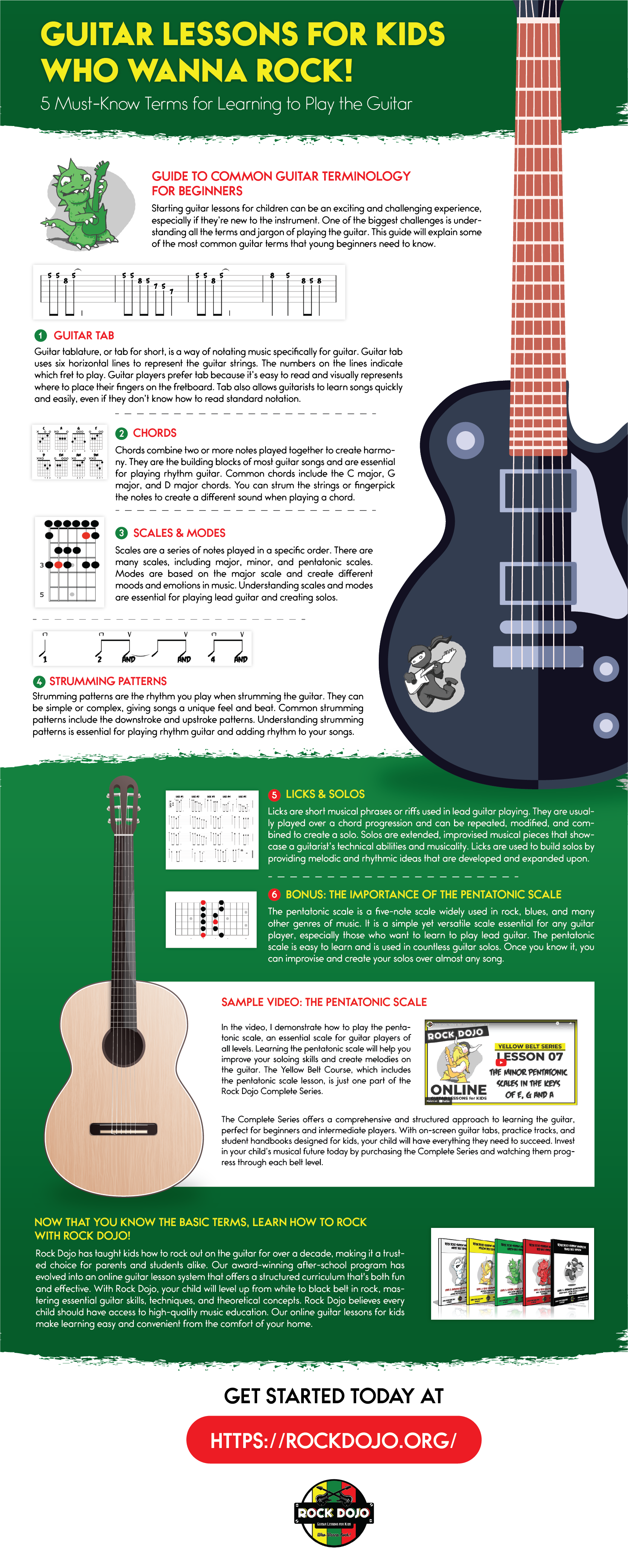
Guide to Common Guitar Terminology for Beginners
Starting guitar lessons for children can be an exciting and challenging experience, especially if they’re new to the instrument. One of the biggest challenges is understanding all the terms and jargon of playing the guitar. This guide will explain some of the most common guitar terms that young beginners need to know.
Infographic – Common Guitar Terminology for Children’s Guitar Lessons
his infographic provides a visual guide to some essential guitar terminology for children’s guitar lessons. Understanding these terms is critical for young beginners to get a head start on their musical journey and become confident guitar players. The infographic includes important terms like guitar tab, chords, scales, strumming patterns, licks, solos, etc.

Guitar Tab for Guitar Lessons for Children
Guitar tablature, or tab for short, is a way of notating music specifically for guitar. Guitar tab uses six horizontal lines to represent the guitar strings. The numbers on the lines indicate which fret to play. Guitar players prefer tab because it’s easy to read and visually represents where to place their fingers on the fretboard. Tab also allows guitarists to learn songs quickly and easily, even if they don’t know how to read standard notation.
Understanding Chords for Guitar Lessons for Children
Chords combine two or more notes played together to create harmony. They are the building blocks of most guitar songs and are essential for playing rhythm guitar. Common chords include the C major, G major, and D major chords. You can strum the strings or fingerpick the notes to create a different sound when playing a chord.
Scales and Modes For Guitar Lessons for Children
Scales are a series of notes played in a specific order. There are many scales, including major, minor, and pentatonic scales. Modes are based on the major scale and create different moods and emotions in music. Understanding scales and modes are essential for playing lead guitar and creating solos.
Strumming Patterns for Guitar Lessons for Children
Strumming patterns are the rhythm you play when strumming the guitar. They can be simple or complex, giving songs a unique feel and beat. Common strumming patterns include the downstroke and upstroke patterns. Understanding strumming patterns is essential for playing rhythm guitar and adding rhythm to your songs.
Licks and Solos
Licks are short musical phrases or riffs used in lead guitar playing. They are usually played over a chord progression and can be repeated, modified, and combined to create a solo. Solos are extended, improvised musical pieces that showcase a guitarist’s technical abilities and musicality. Licks are used to build solos by providing melodic and rhythmic ideas that are developed and expanded upon.
The Importance of the Pentatonic Scale
The pentatonic scale is a five-note scale widely used in rock, blues, and many other genres of music. It is a simple yet versatile scale essential for any guitar player, especially those who want to learn to play lead guitar. The pentatonic scale is easy to learn and is used in countless guitar solos. Once you know it, you can improvise and create your solos over almost any song.
Sample Video: The Pentatonic Scale
In the video, I demonstrate how to play the pentatonic scale, an essential scale for guitar players of all levels. Learning the pentatonic scale will help you improve your soloing skills and create melodies on the guitar. The Yellow Belt Course, which includes the pentatonic scale lesson, is just one part of the Rock Dojo Complete Series. The Complete Series offers a comprehensive and structured approach to learning the guitar, perfect for beginners and intermediate players. With on-screen guitar tabs, practice tracks, and student handbooks designed for kids, your child will have everything they need to succeed. Invest in your child’s musical future today by purchasing the Complete Series and watching them progress through each belt level.
Other Important Terms
Other essential terms for beginners include arpeggios, fretting, and fingerpicking. Arpeggios are chords played one note at a time, while fretting is pressing down on the strings to create different notes. Fingerpicking is a technique used to play individual notes on the guitar using your fingers.
Conclusion
This guide provides a comprehensive overview of some essential guitar terminology for beginners, including chords, scales, strumming patterns, licks, solos, and guitar tab. Understanding these terms will help you get a head start on your musical journey and give you the foundation you need to become a confident guitar player. If you’re ready to take your playing to the next level, invest in your musical education by purchasing the Rock Dojo Complete Series.
Invest in Your Child’s Musical Education Today: Purchase the Complete Series!
Rock Dojo’s Complete Series gives your child the comprehensive guitar education they deserve. With professionally produced videos, on-screen guitar tabs, practice tracks, and student handbooks designed for kids, your child will have everything they need to succeed. And the best part? The Complete Series offers unbeatable value at just $249, equivalent to forty private guitar lessons. Compare that to the nearly $2,400 in private lesson fees, and it’s a no-brainer. With Rock Dojo’s proven track record of teaching thousands of kids in our award-winning after-school program, you can trust that your child is in good hands.
Invest in your child’s musical future today by purchasing the Complete Series and watching them progress through each belt level. Give the gift of music, and your child may become the next guitar virtuoso!
Click here to learn more or purchase the Rock Dojo Complete Series.
And feel free to reach out to Rock Dojo on Facebook if you have any questions.


